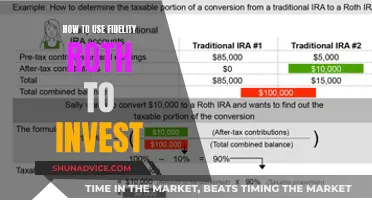
Whole life insurance is a type of permanent life insurance that covers you for as long as you live, as long as premiums are paid. It is primarily used to provide a death benefit for your family when you pass away. However, it can also be used as an investment tool. Whole life insurance policies have a cash value component that grows at a guaranteed rate over time, offering stable and predictable returns. This cash value can be borrowed against or withdrawn for various financial goals, such as funding a child's education, supplementing retirement income, or covering emergency expenses. While whole life insurance may not be suitable for everyone due to its high premiums and slow cash value accumulation, it can be a valuable addition to a financial plan, especially for those with high net worth, lifelong dependents, or a need for estate planning.
What You'll Learn

Peace of mind for your family
Whole life insurance is a powerful financial tool that can offer peace of mind for your family. Here are some reasons why:
Guaranteed death benefit
Whole life insurance provides coverage for your entire life, unlike term life insurance, which only covers a specific number of years. This means that as long as you pay the required premiums, your family will receive a death benefit when you pass away. The death benefit is also guaranteed, meaning your loved ones will receive a set amount of money, regardless of how much cash value you have built up.
Financial protection for your family
Whole life insurance offers a death benefit that can keep your family financially secure in the event of your passing. It can be a good way to leverage your money, as you are fully protected with your first payment. Additionally, the death benefit is tax-free for beneficiaries, providing additional financial relief during a difficult time.
Accumulation of cash value
Whole life insurance allows you to accumulate cash value that grows at a steady, guaranteed rate. This cash value is not subject to market risk and can complement fixed-income investments in your portfolio. You can even customize your policy by setting a premium-paying period to pay up your policy faster and accelerate cash value growth. The cash value can be used to pay for big-ticket items, such as a new home or starting a business.
Replacement for your human capital
Whole life insurance can help replace your "human capital" if you're no longer around to provide for your family. This includes wages, benefits, Social Security, and any other forms of compensation you would typically expect to receive. By purchasing whole life insurance, you can ensure your family's financial security even in your absence.
Tax advantages
The cash value growth in whole life insurance is tax-advantaged, meaning it accumulates tax-deferred. This allows your money to grow without being taxed until you withdraw it. Additionally, you can withdraw the basis that you paid into the policy tax-free. These tax advantages can help maximize the value of your investment.
Using Linear Regression to Optimize Your Investment Strategies
You may want to see also

Grow your wealth
Whole life insurance is a type of permanent life insurance that offers lifelong coverage and accumulates a cash value over time. While it is not a traditional investment vehicle, it can be a valuable tool for growing your wealth and achieving your financial goals. Here are some ways whole life insurance can help you grow your wealth:
Guaranteed Growth and Tax Advantages
Whole life insurance offers a guaranteed and steady growth of cash value, which is tax-advantaged. The cash value grows at a fixed rate, providing predictable and stable returns that are not subject to market risk. This can be especially beneficial if you are looking for conservative and stable investment options. The growth of cash value is also tax-deferred, meaning you don't pay taxes on the interest earned, as long as the funds remain in the policy. This feature makes whole life insurance an attractive option for those seeking tax-efficient wealth accumulation.
Diversification and Risk Management
Including whole life insurance in your investment portfolio can provide diversification benefits. Unlike traditional investments such as stocks or bonds, the returns on whole life insurance are not correlated to the financial markets. The guaranteed growth of cash value in whole life insurance can help balance out the risks associated with market-based investments. This diversification can be particularly advantageous during market downturns, as the cash value in your whole life insurance policy can serve as a stable source of funding.
Retirement Planning
Whole life insurance can be a valuable component of your retirement planning. The cash value accumulated in your policy can supplement your retirement income, especially during market downturns when other investments may be performing poorly. Additionally, you have the option to withdraw or borrow against the cash value to meet retirement expenses, providing flexibility in managing your finances during retirement.
Emergency Funds
The cash value in your whole life insurance policy can also serve as a source of emergency funds. While it is recommended to keep some cash in a traditional bank account for immediate access, the cash value in your policy may grow faster than the interest earned in a typical bank account. This feature ensures that you have a readily available source of funds to cover unexpected expenses or financial setbacks.
Estate Planning
Whole life insurance can play a crucial role in your estate planning. The death benefit provided by whole life insurance can help your family pay estate taxes and safeguard your assets. Additionally, the cash value accumulated in the policy can be used to reinvest and create generational wealth for your heirs. By setting up an irrevocable life insurance trust (ILIT), you can ensure that the death benefit proceeds from your whole life insurance policy pass to your heirs outside of your taxable estate, maximizing the value transferred to the next generation.
Cash or Invest: Where Should Your Money Go?
You may want to see also

Set aside emergency funds
Setting aside emergency funds is an essential part of financial planning. Life is unpredictable, and unforeseen circumstances such as a job loss, a market downturn, or an unexpected major expense can occur. Having an emergency fund ensures financial stability and peace of mind during challenging times. Here are some reasons why setting aside emergency funds is crucial:
Avoid Financial Instability and Debt:
Financial experts universally recommend having an emergency fund to cover unexpected expenses or a loss of income. Without one, you may find yourself in a financially unstable situation, relying on high-interest debt or depleting your long-term assets. An emergency fund helps you maintain your financial stability and avoid accumulating debt.
Peace of Mind and Preparedness:
By setting aside emergency funds, you can rest assured that you have a financial safety net to weather short-term crises. This fund will enable you to handle unexpected expenses or a temporary loss of income without derailing your long-term financial goals. It ensures that you are prepared for unforeseen circumstances and can maintain your standard of living.
Protect Long-Term Investments:
An emergency fund acts as a buffer, allowing you to avoid liquidating your long-term investments prematurely or at unfavourable prices. You can preserve your investment portfolio and protect its growth potential by having a separate fund for emergencies. This way, you maintain your financial strategy and don't sacrifice your future financial goals.
Maintain Liquidity and Accessibility:
It is recommended to keep your emergency fund in a liquid and easily accessible account, such as a savings or money market account. This ensures that you can quickly access your funds when needed. In contrast, investing your emergency fund may subject it to market fluctuations and reduce its liquidity, defeating the purpose of having readily available funds for urgent situations.
Build a Safety Net:
Start by allocating a portion of your income each month to a dedicated emergency fund account. Additionally, channel any extra funds, such as tax refunds or bonuses, into this account to boost your savings. You can also consider using the cash value of your whole life or universal life insurance policy in emergencies, although this may reduce your policy's death benefit.
In conclusion, setting aside emergency funds is a crucial step in achieving financial security. It ensures that you are prepared for unforeseen events, protects your long-term investments, and provides peace of mind during challenging times. By maintaining a dedicated emergency fund, you can effectively manage short-term financial crises while staying on track with your long-term financial goals.
Least Preferred Investment Analysis Techniques by CFOs
You may want to see also

Supplement retirement income
Whole life insurance can be a good way to supplement retirement income, but it is not suitable for everyone. It is expensive and often takes over a decade to earn reasonable investment returns, so it is generally only a good option for those who are relatively young, have a high income, and want to pass money to their family.
Whole life insurance is a permanent life insurance policy that builds cash value over time. This cash value can be used to supplement retirement income, and it is not subject to the volatility that sometimes affects retirement accounts. The cash value grows at a guaranteed rate, and it is not dependent on market investment returns or interest rates. This can be beneficial in times of market downturn, as you can draw from the policy's cash value without having to sell investments that have lost value.
The cash value of a whole life insurance policy also has favourable tax treatment. Tax is deferred while the cash value grows, and you don't have to pay income taxes on the money withdrawn from the policy up to the amount you have paid in premiums.
Whole life insurance can be a useful addition to your financial portfolio, providing stability and an emergency fund. However, it should not be your only source of retirement income. Investing in a retirement account, like an IRA or 401(k) plan, is typically a more efficient way to save for retirement, especially if your company has a matching program.
Additionally, the premiums for whole life insurance tend to be much higher than term life insurance, and the cash value can be slow to grow. For these reasons, it is important to consider your individual financial circumstances and seek professional advice before deciding if whole life insurance is a good option for supplementing your retirement income.
Utilizing 0% APR Credit Cards for Investment Opportunities
You may want to see also

Leave something behind for your family
Whole life insurance is a powerful financial tool to ensure your family's financial security in your absence. It offers a death benefit to your family when you pass away, and its cash value can be used to pay for big-ticket items or supplement retirement income.
Whole life insurance is a type of permanent life insurance that covers you for your entire life. It is more expensive than term life insurance but provides a guaranteed death benefit and accumulates a cash value that grows at a fixed rate and is tax-advantaged. This cash value can be accessed through loans or withdrawals and can be used to pay for significant expenses, such as a new home or a child's education.
The cash value of whole life insurance grows slowly but steadily and is not subject to market risk. This makes it a stable and predictable investment option, providing peace of mind and financial security for your family. It can also be used to create generational wealth by setting up an irrevocable life insurance trust (ILIT). The death benefit proceeds from a whole life insurance policy owned by an ILIT may pass to your heirs outside of your taxable estate, helping them cover estate taxes and continue building wealth.
Whole life insurance is a valuable tool to protect your family's financial future and ensure they receive a guaranteed death benefit. It provides financial flexibility and stability, allowing your family to maintain their standard of living, cover any debts or expenses, and build their own wealth.
Fidelity Investments: Are They Fiduciaries?
You may want to see also
Frequently asked questions
Whole life insurance is a type of permanent life insurance that covers you for your entire life. It provides a death benefit to your family when you pass away and also has a cash value component that grows over time.
Whole life insurance offers guaranteed returns and can provide financial protection for your family. It can also help you grow your wealth, set aside funds for emergencies, and leave something behind for your family. The cash value component is tax-advantaged and can be used to supplement retirement income.
Whole life insurance offers guaranteed returns and is not subject to market risk. It can be a stable source of funding that is not affected by market volatility. However, the cash value may grow slower than with other investments, and you may be able to get higher returns with stocks, bonds, or real estate.
Whole life insurance may be suitable for individuals who have maxed out their retirement accounts and are looking for additional tax-deferred savings options. It can also be useful for parents with lifelong financial dependents, such as children with disabilities, and for businesses as a contingency plan for the loss of a key employee or partner.
The premiums for whole life insurance tend to be much higher than term life insurance. The cash value may take several years to grow, and the rate of return can be low compared to other investments. Additionally, you may not have control over your investment choices, as the insurance company chooses where to invest the cash value.







